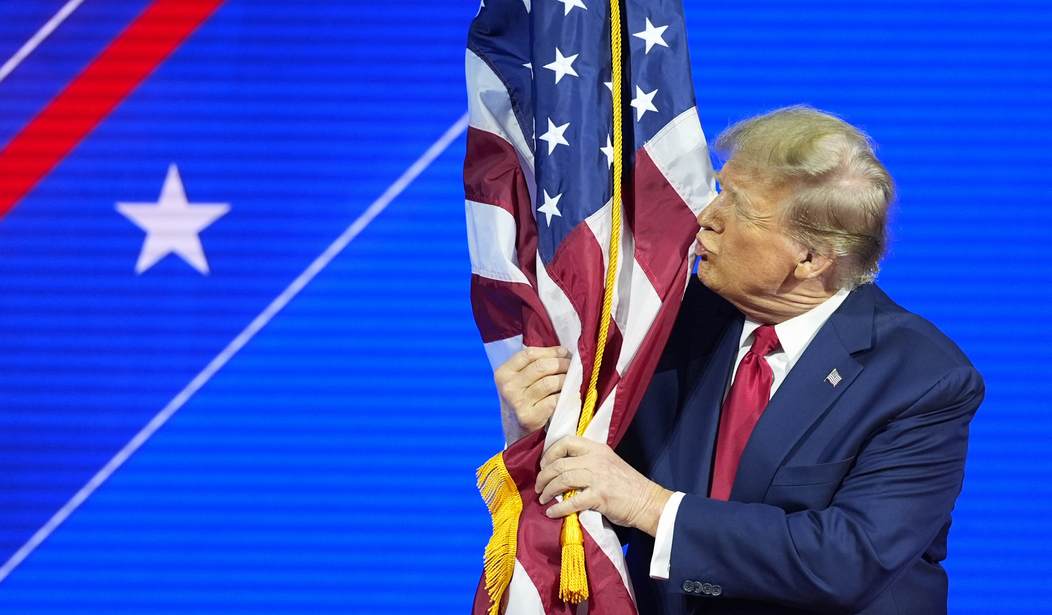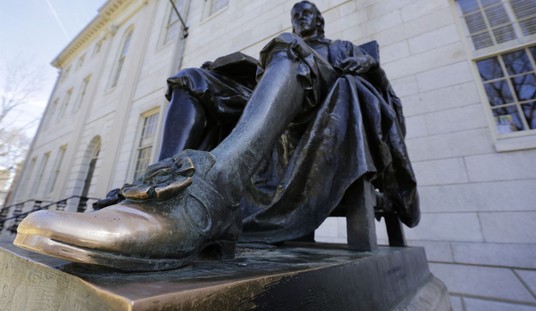I was preparing this report on the little-noticed decline of American patriotism to post today when, Boom, news arrived that an Oklahoma high school had informed a student there that he's not allowed to drive onto school property with a U.S. flag on his car.
My colleague Jeff Charles has the full report here. School officials explain they don't want any distractions from school business. So, they created their own distraction by enforcing this made-up rule against the American flag, of all things.
I grew up in an era when the American flag was not only special but sacred. Still is to many of us. Every single school day started with each student rising, facing the U.S. flag, putting a hand over their heart, and reciting together the Pledge of Allegiance.
It never occurred to anyone to kneel or stay seated in protest of something made up.
The flag was hanging near what appeared to be an unfinished painting of George Washington (he was our first president, you know). He got his own holiday on whatever day Feb. 22 fell on. Same for Abraham Lincoln and Feb. 12. And if one came on the weekend, we were out of luck.
Lincoln, the 16th president, actually declared the first president's birthday a national holiday in 1862. One-hundred-and-six years later, Congress, under pressure from commercial and union interests that favored a long midwinter weekend, changed the holidays to the third Monday in February. Since both presidents were dead, they couldn't do anything about it.
After Christmas and Valentine's Day expenses but before Easter spending thus became an ideal time, the bedding industry decided, for annual Washington Day Mattress sales, a unique honor for the commander of the Continental Army, who led the Revolution.
The school room Pledge took, what, maybe 20 seconds out of the school day. But it was an integral part of soaking our minds in the special nature of the land we inhabited with our families and friends. Not a bad lesson for every child to absorb through a brief ritual. I would argue it's an essential one.
Some of us from those classrooms went on to serve in the armed forces and even devote an entire career to the military, serving and protecting the special land we inhabit and the freedoms handed down by our families and generations that came before.
Every November, my high school held a special memorial service for those graduates who did not return home alive. And that included some of its six alums who had earned the Medal of Honor.
That school and its administration still revere the flag and such events. But in many schools and other institutions, the poison of the Woke culture has crept into respect for the flag and patriotism. I remember, bitterly, the long time that a president named Barack Obama resisted wearing the simple little flag pin on his lapel. But then, he didn't grow up in a U.S. school classroom. More on that in the audio.
Yes, the flag pin or even the flag is a symbol. But symbols are very important to the strength of a people. Gives them something besides Burger King and Instagram to share and treasure as the common fabric of their national lives.
That's what this week's audio commentary is about. After you listen, be sure to share your thoughts on this topic in the Comments below — and with your families at home. This is how we pass our traditions on to future generations, some of whom have been denied that richness in their lives by an absurd modern meme.
But first, take a glance at the photo above, specifically what's on that man's lapel.
A lot of attention has naturally focused on the Nancy Pelosi mob forcing the duly elected presidential nominee of the Democrat Party, Joe Biden, off of the November ticket after he vowed to keep the nomination unless the Almighty told him otherwise. So, Pelosi took it upon herself to play that role.
But not much attention has been focused on the other half of the deal to dump Biden, the price that Democrat bigs were unilaterally willing to offer Biden on behalf of all Americans. That price was: The 81-year-old man, who is too mentally and physically impaired to start a second presidential term in January, was allowed to remain a mentally and physically impaired commander in chief until then.
That seems extremely risky. So, I wrote about that in this week's Sunday column.
The most recent audio commentary examined whether national party conventions maintain any relevance. Obviously, television enjoys covering them — and selling expensive advertising throughout.
But now that these expensive four-day extravaganzas no longer play an actual role in selecting the nominee, is a long political infomercial really worth it to viewers? I've been to pep rallies. I've been to quite a few conventions, as a reporter and even a delegate. But pep rallies that endure for four weekdays seem a bit much.














